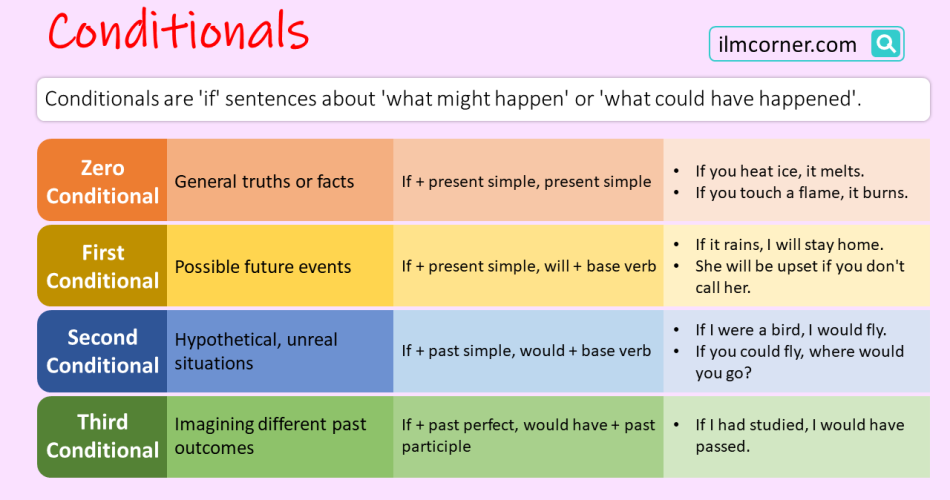In English, we use Conditionals to talk about different kinds of situations. Conditional Sentences are special because they have ‘if’ in them and talk about ‘what could happen’. There are four main types. The first type is about things that are always true, like facts. The second kind is about things that might happen soon. The third kind is for imagining things that are not real right now. The last kind is for thinking about the past and what didn’t happen. Each type of Conditional Sentence helps us talk about different things.
Four Conditionals Sentences
1. Zero Conditional – Talking About Facts
The Zero Conditional is used for facts and things that are always true.
Structure: If + present simple, present simple.
Example:
- If you heat water to 100 degrees Celsius, it boils.
- If you mix red and blue, you get purple.
- When water reaches 0 degrees Celsius, it freezes.
- If you touch a flame, it burns.
- Plants die if they don’t get enough water.
- If you heat ice, it melts.
2. First Conditional – Real Possibilities in the Future
The First Conditional is used for things that might really happen in the future.
Structure: If + present simple, will + base verb.
Example:
- If it rains tomorrow, I will take an umbrella.
- If it snows tomorrow, we will build a snowman.
- If I finish my work early, I will watch a movie.
- She will be upset if you don’t call her.
- If the team wins, they will celebrate tonight.
- I’ll go for a walk if the weather is nice.
3. Second Conditional – Imaginary Situations
The Second Conditional is for imagining things. These are not real right now but are interesting to think about.
Structure: If + past simple, would + base verb.
Example:
- If I were a bird, I would fly around the world.
- If I were a millionaire, I would travel the world.
- If you could fly, where would you go?
- She would buy a house if she won the lottery.
- If I had a superpower, it would be invisibility.
- He would become a chef if he didn’t love engineering so much.
4. Third Conditional – Imagining Different Past
The Third Conditional is for thinking about the past. It’s used when you imagine a different outcome from what really happened.
Structure: If + past perfect, would have + past participle.
Example:
- If I had studied harder, I would have passed the exam.
- If I had known about the party, I would have attended.
- She would have passed the test if she had studied more.
- If we had left earlier, we wouldn’t have missed the train.
- He would have bought the car if he had had enough money.
- They would have been happier if they had traveled last summer.
